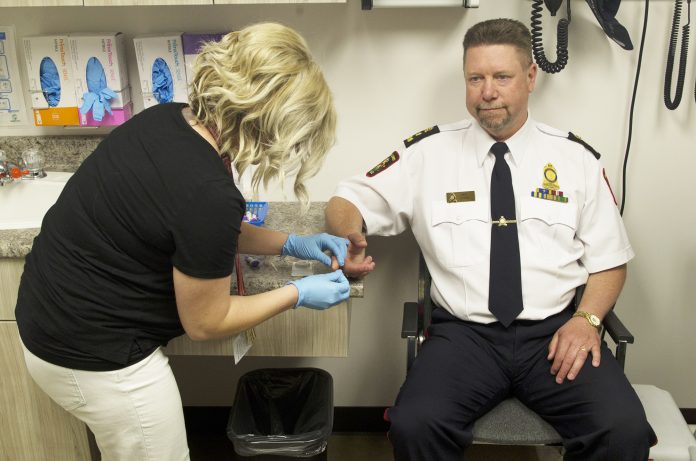
Prince Albert Police Chief has had needles before, but Monday’s test was different.
Cooper, along with city councillor Evert Botha and MLA Nicole Rancourt were on hand to help employees at Access Place demonstrate how easy it is to get tested for HIV. He wasn’t worried about the test, but he did have other things on his mind.
“I knew it wouldn’t bother me, but I’d have been rather embarrassed if I’d passed out in front of all the media today,” Cooper chuckled.
Although he joked about his own test Cooper is much more serious about the lack of HIV testing in Saskatchewan.
The province has some of the highest rates of HIV in Canada, and with HIV Testing Day on June 27, he wanted to make sure local residents were informed about testing and treatment methods.
“We want to make sure people who are HIV positive receive treatment, and we know there’s lots of social stigma around that,” he said. “There may be social reasons, why people are not getting tested, so we’re hoping to normalize the process.”
Cooper isn’t alone in worrying about how few people are getting tested. In the Prince Albert Parkland Health Region, there are roughly 61 HIV patients for every 1,000 people, well ahead of the provincial average of 3.9 per 100,000.
Local health experts say one of their biggest concerns is convincing people to take an HIV test. However, that’s not as easy as it sounds.
“There’s a huge stigma to being tested,” said Navid Robertson, a family physician in Prince Albert. “Even a few years ago, being tested might affect someone’s health insurance rates because it was seen as an admission you were involved in high risk behavior. We’re just trying to get as far away from that as possible.”
The negative repercussions aren’t the only problem. Robertson is also concerned about how little the public knows about the testing process, as well as HIV treatment itself.
Today, treatment is easy as taking a pill once a day. However, it’s sometimes difficult to convince people it’s that simple.
“Years ago people were dying in hospital and we didn’t know why, and so there’s a lot of stigma that follows that,” Robertson explained. “People are afraid to know their status. They’re afraid of what it means. They’re afraid of other people knowing. They’re afraid of even being association with being tested sometimes, so what we’re really trying to do is break down those barriers.”
Part of breaking down those barriers involves things like Saskatchewan HIV Testing Day, which will be held today for the first time. The purpose is to promote and offer HIV testing throughout the province, in hopes of making residents more comfortable with it.
As part of the campaign, a testing and mini-health fair will held at Access Place from 1:30 p.m. to 3:30 p.m.
Despite his concerns about the lack of HIV testing, Roberston maintains that things are starting to get better.
“It’s a big turn around and a big culture shift, but we’re seeing very dedicated efforts by groups of physicians in the higher impact areas in our province,” he said. “In certain areas where the rates were astronomical a few years ago, they haven’t had a new case in several years and the reason is patients were found and they were started on medication.”
@kerr_jas • jason.kerr@paherald.sk.ca

